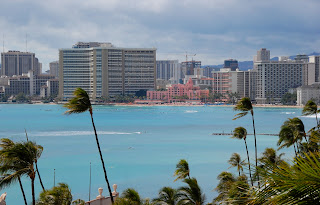The humiliation for Australia and New Zealand comes with the authority Bainimarama will now wield as the leader of a virile regional grouping - backed, incidentally, by the Chinese - that's increasingly regarded as more important than the long-established Pacific Islands Forum, which links the MSG members with Australia, NZ and the smaller island states. Australia and NZ managed to get Fiji suspended from the Forum two years ago because of Bainimarama's 2006 coup. But now, the regional "bad guy" gets to be the top guy in the MSG, strutting around as chair of an alternative grouping that's certainly much more representative of the Pacific's biggest players and biggest populations - the nearly seven million people in PNG and 850-thousand in Fiji.
When Fiji was suspended from the Forum in 2009, Bainimarama mocked the then Forum chair who made the announcement - Toke Talagi, the prime minister of Niue - as a stooge of the Aussies and Kiwis. Whatever the truth, Talagi represented a population of just 14-hundred or barely three fully-laden jumbo jets. And those other Pacific leaders who support Australia and NZ's hardline position on Fiji - notably Samoa's Tuilaepa Malielegaoi - are also the Pacific's small guys, however impressive their individual physiques may be.
 |
| High stakes loser: Edward Natapei |
Since then, Bainimarama has managed to use Fiji's diplomatic influence and his keen sense of Melanesian politics to first marginalise Natapei and then rely on the Vanuatu leader's chief political opponent, Sato Kilman, to destroy him. Much of Kilman's campaign against Natapei was based on casting him as a man in the thrall of the Aussies and Kiwis who was prepared to betray a Melanesian brother in exchange for more than 60-million dollars in Australian aid. Whether or not the charge was justified, Melanesian "big man" politics is notoriously unforgiving. Natapei has since been consigned to the electoral dustbin and Kilman thereby removed the one remaining impediment to Frank Bainimarama assuming the leadership of the MSG. Australia and New Zealand - the region's big boys - lost both the battle and the war.
Even members of Australia's foreign affairs establishment now concede that on top of his 2006 coup, Frank Bainimarama has successfully scored another coup in securing the MSG chair. Jenny Hayward-Jones is a former Canberra diplomat who's director of arguably the region's most influential and certainly best funded think tank - the Myer Foundation Melanesian Program at the Lowy Institute. Once in the front line of the cheer squad urging Australia and NZ to apply the strictest sanctions against Bainimarama, Hayward-Jones appears to have had a dramatic change of heart. Describing the Fijian dictator's victory in securing the MSG leadership as "a real coup", she's now urging an urgent re-evaluation of Australian and NZ policy towards Fiji.
 |
| Missing link: Where's Fiji? "Rudd blocked" |
Beijing isn't just getting a significant strategic and economic foothold in Fiji with the deterioration of Bainimarama's relationship with Canberra and Wellington. The Chinese are also cultivating the MSG to the extent of funding its secretariat in the Vanuatu capital, Port Vila. Hayward-Jones is right. These developments present a clear and present danger to Australia's interests in the region. It certainly seems an extraordinary paradox that while some of its strategic defence planners are urging Australia to arm itself with US nuclear submarines to counter a perceived Chinese threat, Canberra should be so cavalier about its relationship with a budding Chinese satellite like Fiji.
But is there any sign of policy change? Evidently not, judging by the recent comments of Kevin Rudd. During a visit to Wellington at the weekend, the Australian foreign minister was clearly irritated when a TVNZ interlocutor asked him if it was time for both countries to revise their attitude towards Fiji. Rudd refused to answer the question directly, saying there was often a tendency to focus on what Australian and New Zealand diplomacy should be doing rather than putting the onus on the Bainimarama regime. It was the Fijian leader, he said, who had to change and the trans-Tasman partners would continue to be vigorous in calling for democracy and "were not in the business of legitimising" what had been "a very ugly military coup". So what Canberra insiders have long termed the "Rudd block" in achieving any change in current policy towards Fiji continues, whatever the strategic pitfalls.
 |
| New ties: Peter Thomson and UN Sec Gen Ban Ki Moon |
This tiny European state of just over half a million people has the kind of big aspirations that Frank Bainimarama finds irresistible, way beyond its membership of the European Union, where it could clearly be a crucial ally for Fiji. Like Australia, Luxembourg wants a temporary seat on the UN Security Council. And how do you get that? Well, you go lobbying to the four corners of the earth. So while Kevin Rudd traverses the length and breadth of Africa trying to secure Australia's seat, a group of suave Europeans from a place famous mostly for being a refuge for funny money have appeared in the South Seas to roger the Aussies in their own backyard. You can bet they'll be downing lots of kava and slow-cooked pork on a nod and a wink from the beaming dictator that Fiji's precious vote will be theirs. It's a funny old world - and Frank Bainimarama is getting the last laugh.
This article by Graham Davis has subsequently appeared in The Australian, the Fiji Sun and news websites throughout the Asia Pacific.
























